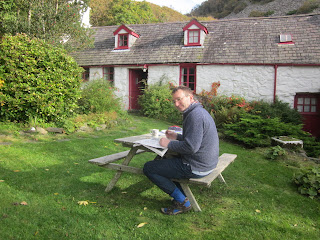Our preacher started a recent sermon by saying,
"Most academics, and rational people believe Jesus existed, and think of him as 'a good man'. But Jesus can not have
just been a good man. If what is recorded about what he said is correct, he was either divine, or a bad man."
This is a true saying, except that for many hundreds of years, Muslims have contented that Jesus was a prophet of Allah, whose words were twisted and misrepresented by later Christians. Therefore the New Testament record can not be trusted. (Shabir Ally actually argues that the biblical account is true, just misinterpreted by Christians. See
http://www.islam-guide.com/ch3-10-1.htm)
There are many arguments to challenge this perspective. Biblical texts were distributed far and wide across the middle East and Egypt. (See 'A New Eusebius' for English translations of these documents.) For the biblical record to be uniformly changed this would have taken a concerted effort from a significant power, (such as Constantine.) There would certainly have been some record of this change in the history of theology, just as there has been for schisms and argument throughout time. The minutes of a number of councils, drawing theologians from across the known world, to define the biblical cannon, are well documented. These meetings were known to be very conservative, and the main drive was to chuck out anything that did not feel to be authentic, even if it was felt to be edifying. There was a great suspicion of 'new doctrine'.
However, if we are to define Christ as divine avoiding the arguments about New Testament texts being altered, then we have to use the Jewish texts, which no one argues have been changed, because they are guarded and protected by the Jewish people.
James Dunn's book 'Did the first Christians worship Jesus' addresses this subject. Did they see Jesus, in the way believers do today? Early Christians did not have the New Testament that we have. They will have continued to use the Torah as their main spiritual source book. Dunn concludes the introduction by saying
"What I hope will become apparent is that the first Christians did not see worship of Jesus as an alternative to worship of God. Rather, it was a way of worshipping God. That is to say, worship of Jesus is only possible or acceptable within what is now understood to be a Trinitarian framework. Worship of Jesus that is not worship of God through Jesus, or, more completely, worship of God through Jesus and in the Spirit, is not Christian worship." page 6.
Many verses in the Torah describe the 'Son of Man', or Messiah. Daniel makes it clear that the Son of Man is to be worshipped.
Daniel 7: 13-14
I saw what looked like a son of man coming with the clouds of heaven,
and he was presented to the Eternal God.
He was crowned king and given power and glory,
So that all the people of every nation and race would serve him.
He will rule for ever, and his kingdom is eternal,
never to be destroyed.
Psalm 110:1 says
The Lord said to my Lord,
Sit at my right side,
until I make your enemies into a footstool for you.
In Matthew 22 Jesus acknowledges with the Pharisees that this prophecy refers to the Messiah.
Mark Roberts, in his blog (linked below), argues that the clearest evidence that 'Jesus', the Messiah is divine is that throughout the old Testament, God explains to Israel that
He himself will rectify the disaster brought on the human race by evil. This is the meaning, in the otherwise cruel story, of Abraham attempting to sacrifice Isaac.
I agree that this, above all reasons, is the greatest reason to believe that Jesus is one with the Father.
My own father once explained to me, after I asked him why Jesus had not been more explicit about his divinity, saying something like this:
"Jesus didn't make it straight forward. You are forced to have to work it out. Like with his disciples, it only starts to make sense when you get to know him."
Then Jesus asked the disciples, "Why can't you understand? How can you be so slow to believe all that the prophets said? Didn't you know that the Messiah would have to suffer before he was given his glory? Jesus then explained everything written about himself in the scriptures, beginning with the Law of Moses and the Books of the Prophets."
...At once they knew who he was, but he disappeared. They said to each other, "When he talked to us along the road and explained the scriptures to us, didn't it warm or hearts?" Luke 24:23
-----------------------------------------------------
(Rev. Mark Roberts explains why he believes that early Christians believed Jesus to be divine, and that this was not just an extension of Graeco-Roman belief systems. See
http://www.patheos.com/blogs/markdroberts/series/was-jesus-divine/)








































